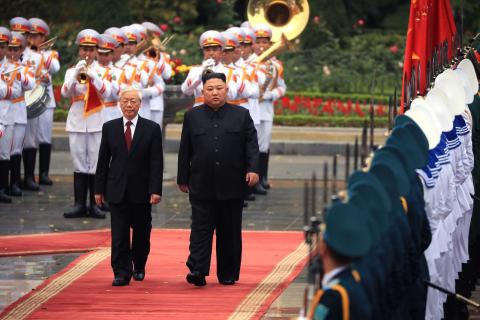The relationship between the factual and fictional representation of a country is a complex question for analysts and the wider public. But drawing both together offers an important link for understanding. Fiction can supplement learning, aid in innovative academic approaches, strengthen strategic analysis, and can even directly influence policy.
However, on issues concerning the Korean Peninsula, fiction is often neglected in favour of academic texts. With the current global popularity of Korea across all cultural sectors – think K-pop, Squid Game or K-dramas – could this soon change?
Passionate students have always turned to fiction to supplement learning in recognition that academic texts lack context and neglect deeper emotional elements. A student can read classic academic texts and primary documents on the Korean War but never fully gain a complete understanding until reading fiction. In the same way, reading contemporary fiction helps address the incapacity to fully understand the nuances of culture hidden in academic studies.
There is today a large number of Korean-American authors and Korean authors in translation whose fictional works should be required reading in any attempt to understand Korean society. Reading the likes of Krys Lee, Lee Chang-rae, Han Kang, Baek Se-hee, or Shin Kyung-sook help students outside Korea to understand the values and emotions that drive the politics, foreign policy, and strategic environment of the Korean Peninsula.
Speculative fiction is also attracting more attention in strategic and intelligence analysis.
Of course, fiction also balances learning with the simple pleasure of a fun story. The Inspector O series of novels are an easy and enjoyable read, delving into the miasmatic otherworldliness of North Korean bureaucracy, politics, and daily life. The author, James Church (a pseudonym), was a career intelligence officer whose choice to pursue fiction places his reach beyond the normal retirement path of academic fellowships, part-time consultancy spells, and thinktank invitationals. His novels enable students to better understand cultural differences as the reader engages and identifies with the various “outsider” heroes as they interact with the world of North Korea.
Over recent years a number of academics have sought to utilize the strengths of fiction both within the field and beyond. Some academics understandably turn to fiction to reach wider audiences. Universities across the globe harbour a sizable number of academics who after years of reaching only an ever narrowing audience of peers, try their hands at creative fiction. This includes international relations scholars widely considered amongst the best in their field.

Other academics turn to fiction as a methodological alternative. Academic papers generally utilize argument, logic, and evidence in the form of scholarly narrative. “Fictional IR” does the same, but instead uses fictional narrative. In this way, Sungju Park-Kang uses fiction to “unpack complex dynamics” in mainstream accounts of North Korea’s 1987 bombing of Korean Airlines (KAL) Flight 858. Such approaches do not allow the reader to passively accept an argument as in an academic text, but rather forces the reader to actively engage through imagination.
More recently, academics have turned to fiction in order to both reach a wider audience and to utilize knowledge outside the confines of academic narrative. Speculative political fiction, like science fiction, imagines an alternative world with its base in contemporary reality. A good example is the work of Jeffrey Lewis, a noted specialist on North Korea’s nuclear and missile programs who turned to speculative fiction in order to communicate concerns regarding North Korea and the Trump Administration in The 2020 Commission Report. Unfortunately for Lewis, Mark Twain’s maxim that fiction must stick to possibilities while truth mustn’t, proved true – as details emerged fictional accounts began to appear less incredible than reality.
The greatest strength of fiction has always been its capacity to reach and ultimately influence the wider population.
Speculative fiction is also attracting more attention in strategic and intelligence analysis. “Fictionalysis” turns to imagination to entertain ideas that cannot be brought out in the staid theoretical, policy, or analytical approaches of mainstream international relations. Such works speculate on future events and/or developments and encourage people outside the field to participate in order to avoid the groupthink that occurs in the mind-numbingly monotonous settings of 1.5-track events where academics, think tankers and government officers gather.
A recent initiative of the NATO Defence College invited member and partner state writers and budding writers to compose stories on the future of the organization. The NATO example demonstrated how a well-managed and thoughtful project can inspire alternative approaches and public interest. To date, there have been no similar attempts to explore Korea policy but given its global popularity, one would not be far off.
Ultimately, the greatest strength of fiction has always been its capacity to reach and ultimately influence the wider population. There’s no better example than Eugene Burdick and William Lederer’s literary classic, The Ugly American. The book blended fact and fiction in a portrayal of US diplomacy in Southeast Asia. The novel went on to influence foreign policy, including inspiring a restructuring of the state department and diplomatic recruitment, the creation of the peace corps, and attempts to transform U.S foreign policy in Southeast Asia.
We are yet to see a similarly influential novel on Korea policy. For many who can see beyond the rhetoric of an “ironclad alliance” and perceive the growing gaps between Seoul and Washington, it may just be a matter of time. What nobody wants to hear may best be expressed in fiction.

